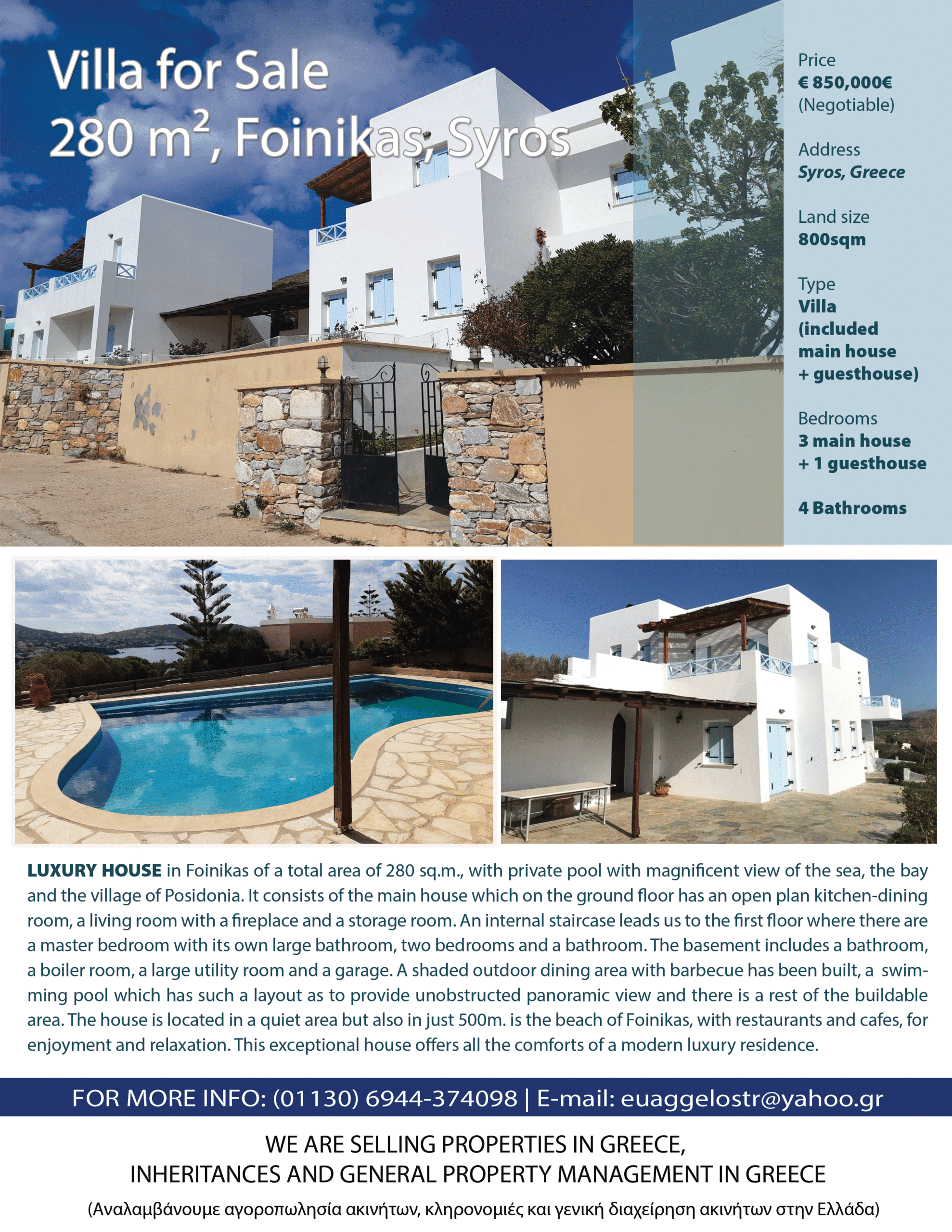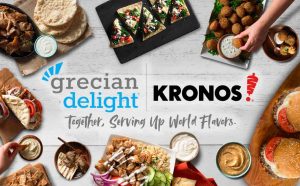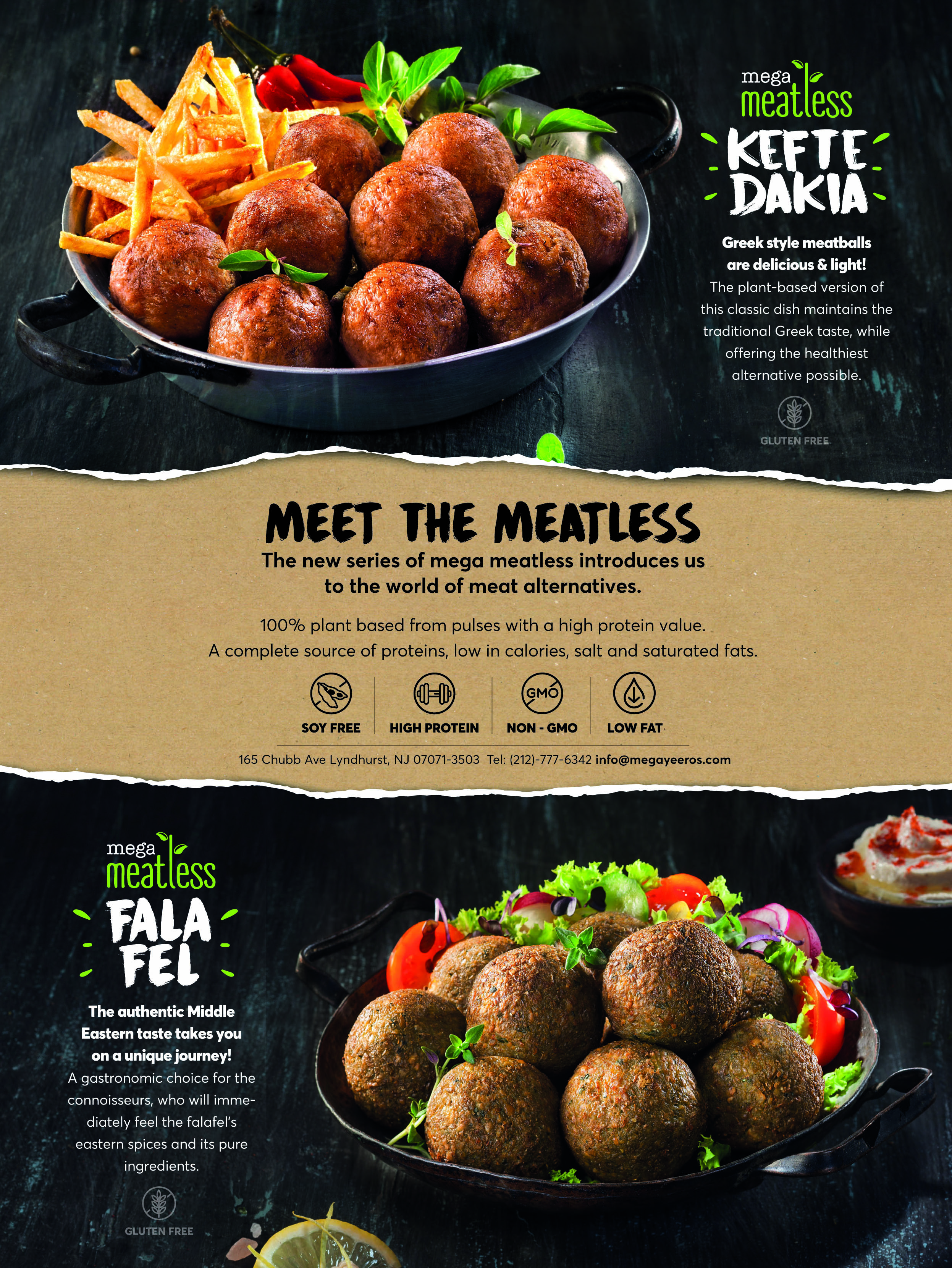Arabica Coffee Roasters
Posted by estiator at 4 April, at 16 : 03 PM Print
INTERVIEW WITH
GEORGE LELES
Arabica Coffee Roasters represents yet another characteristic example of successful collaboration between first- and second-generation Greek-Americans in the food industry. This company presently services over 1,000 accounts in New York, New Jersey, Pennsylvania, and Connecticut. It is run by Steve Leles, together with his sons George and Dimitri, who have made a great contribution to the progress of the company established by their father in 1988. Steve Leles started off in Franklin Lakes, N.J., with 25 customers to whom he sold coffee from other companies. By 1995, the time had come for his company to relocate to Garfield, N.J., where it remains until today.
The eldest of the Leles boys, George, used to help his father during his spare time until he graduated college with a degree in business administration. He started working at Arabica Coffee Roasters on a full-time basis in 2003 and is currently the vice president in charge of sales. Dimitri studied business finance and joined the company full time in 2008. Today he serves as vice president of operations.
The company carries over 100 products. Among them, American coffee blends, single-origin coffees, flavored coffees, espresso, and oreanthi Greek specialty tea.
Arabica founder Steve Leles told Estiator how pleased he is about working with his two sons. “We make a good team that is built around the framework of duties I assigned to them. They are both very active and hardworking, they have built good relations with many clients and have significantly improved both production and sales.” Steve also expressed his appreciation to all of his customers for choosing Arabica Coffee Roasters products.
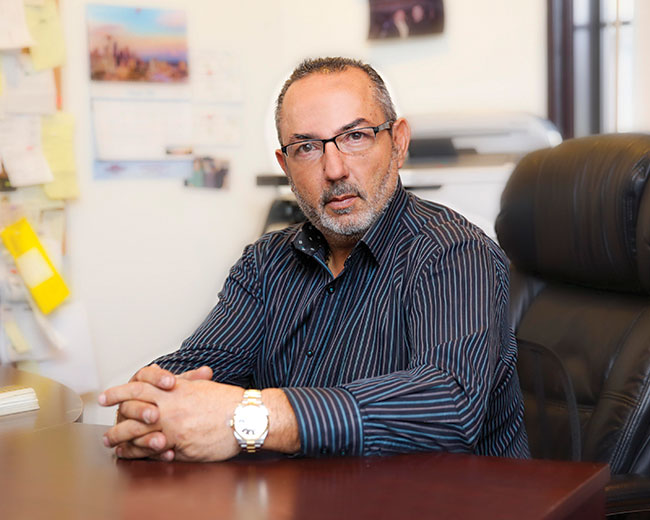
Steve Leles at his desk.
In this series of articles and interviews highlighting the achievements of Greek-Americans in the food industry, Estiator posed questions to George Leles, whose views appear next:
Could you tell us why you decided to name your business Arabica Coffee Roasters?
There are two plant species that produce coffee cherries; Arabica is the better, more widely known in the industry. My father started this business over 25 years ago. He thought it was a good idea to name the business after it.
Do you have any other product lines under the Arabica Coffee Roasters that your clients might not automatically identify as part your company?
A few years ago my brother and I decided that we wanted to create a different product line that focused on higher-end coffee. We decided to call it Leles Brothers Coffee to distinguish our collective contributions to the family business.
Well, it’s not the most unique name, but we understand the symbolic purpose of highlighting something you and your brother created. Tell us something that we don’t know about coffee.
Coffee trees located in higher altitudes generally require more time for the beans to mature because of the cooler climate. The more time the beans need to mature, the more complex the makeup of the bean is and the more flavor that bean will produce, that’s why coffee aficionados are always making a big deal about the altitude level of the coffee trees and the region of the coffee.
Now, there’s obviously a lot of market pressures, changing consumer tastes, and the ascendance of big-box companies, like Starbucks, that are impacting the coffee industry. Where you think the future of the coffee industry is heading?
Overall, the quality of coffee being imported into the United States is improving—drastically, I would say. There is a huge emphasis right now in the market on the origin of the product. It is not uncommon to walk into a cafe in Portland or Seattle and see a picture of the farm where the coffee is harvested along with information on the farmer himself.
Because the West Coast is significantly more advanced than the East, coffee trends originate there and make their way here. If the past is any indication of the future, restaurants will soon carry a wider array of roasts as well as coffee from several different continents. It won’t be uncommon for two patrons to finish eating at a restaurant and one to order an American roast and one to order a French or Italian.
Cold-brew coffee seems to be something of a craze now, I see it everywhere I go. How is it different from conventional iced coffee and why is it so popular?
Cold-brew coffee is ground coffee that is steeped in room temperature water for 12 hours and then filtered and refrigerated. By not using extremely hot water in the process, a certain chemical reaction is omitted which leads to a smoother, less acidic taste in the coffee.
Is it better than the traditional iced coffee?
I really enjoy traditional iced coffee. I think it’s great, especially in the morning. Cold-brew coffee, however, is more potent when brewed properly and more filling, so I tend to enjoy it in the afternoon or even with a meal sometimes. Whatever you may feel about it, there is no denying its popularity, as it is rapidly expanding. We actually have cold brew on tap in our showroom. Employees and customers always get a kick out of using the tap and pouring themselves a drink. Currently we are trying to mass-produce our cold-brew blend for restaurants and delis. It’s something that my brother and I see a lot of growth in and we want to make sure we’re adequately prepared. We plan to roll out a cold-brew program in the spring.
What are you most proud of as a business owner?
I feel that even though we’ve been in business for over a quarter of a century and most of my competitors have been around for over a hundred years, we’re giving a lot of these much larger and established companies a run for their money and carving out a really great niche for ourselves. Over the last three years there has been a tremendous amount of consolidation in the industry, but I feel our focus on quality coffee, training, and marketing has really pushed the field to also become better and that makes us really proud.
Over the last few years the importance of organic and local food has increased tremendously. What are you doing to cater and further develop that pivotal market segment?
We carry a diverse array of organic and single-origin coffees and encourage all of our customers promote the fact that they use locally roasted coffee. Having said that, I urge customers to weigh the benefits and costs of using organic and single-origin coffees which may not be what their customers actually desire and could reduce profits on their end. Each business has its own identity and it’s important to pick a coffee that fits that identity.
You spend a lot of time in restaurants. How has that helped you shape your approach towards servicing them?
Growing up I was really fortunate to have a lot of friends in the industry with some pretty prestigious establishments, and it just really helped me to better understand what they were going through. I would always hear about their issues, whether it was with the help, or vendors shorting them items they had ordered, or people not showing up. I knew that I wanted my business to be one of the things that they didn’t have to worry about. I wanted our business to produce consistently great coffee, inform customers about new market trends, and be as proactive as possible on the service end, and by doing that we would allow people the time and energy to concentrate on growing their businesses.
Service is big in this business—the product could only take you so far, but ultimately, customer service is a real difference-maker.
Service is a really big thing for us. When machines break down or don’t work properly, people lose money, so we make sure to get out there right away. It’s a pretty awesome responsibility; people are essentially trusting you with their income. We owe it to them to get out there fast and fix the issue the first time. We train our technicians when they are in the field to look for problems before they arise, so that really helps us and the customer avoid certain calls.
Where do you see Arabica Coffee Roasters in three years?
We have a near-term and long-term business vision, which we’re making headway on. We would like in three years to start or invest in a retail location, which I believe would not only complement our wholesale business but allow us the opportunity to educate customers—restaurant owners, hospitality executives and their staff—directly about the details of coffee, including how to make the best coffee beverages. Right now we have someone on staff that worked as a barista for the better part of a decade, who goes out on-site to train customers about the product, but it’s not the same as having a retail location.
So you send a barista to train customers on how to make espresso beverages?
Correct. It used to be that my brother and I would go on-site and train the accounts. We realized that while we were good, we weren’t the best; so we hired someone who did it professionally for almost ten years. She arrives two or three days before the venue opens, trains the waitstaff, and then returns a few days after the opening to do a follow-up. We also have people come to our lab for cuppings, which she spearheads.
People make the difference. What does Arabica do to make sure it has the right people on board?
I think that hiring people and keeping them motivated is a huge part of any successful business. For us, we try to find people that are motivated but are also open about doing something different. Compared to other industries, there isn’t a tremendous amount of change in the coffee industry every year. We want to find and work with people who can help us take something that seems ordinary and plain and make it exciting. That’s why as a group we play around with cold brew, we have latte art competitions; we’re not afraid to try different marketing techniques. We’re looking for people that break the norm.
To speak with someone from their team call: (973) 772-9004 or visit them on the web at www.ArabicaCoffeeCo.com.
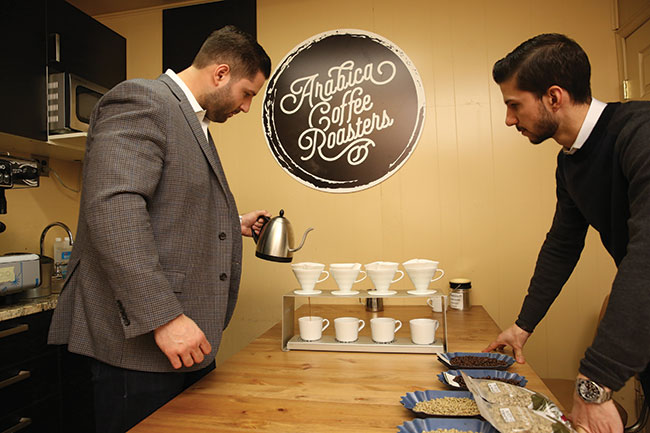
George and Dimitri Leles cupping coffees together.




